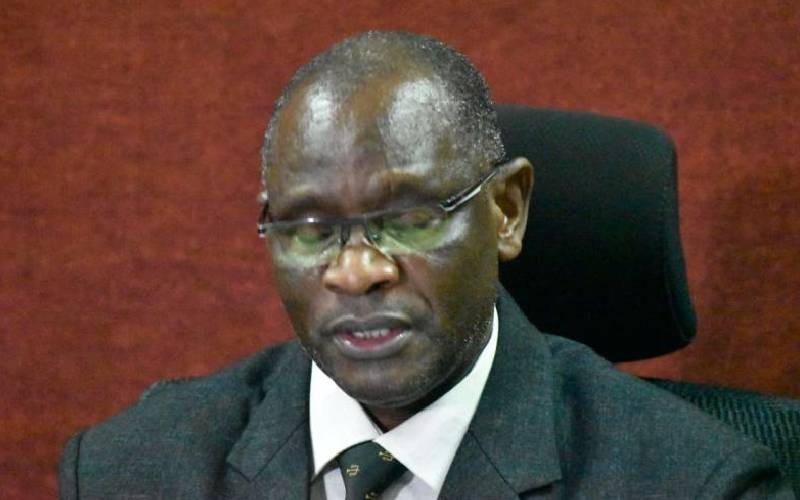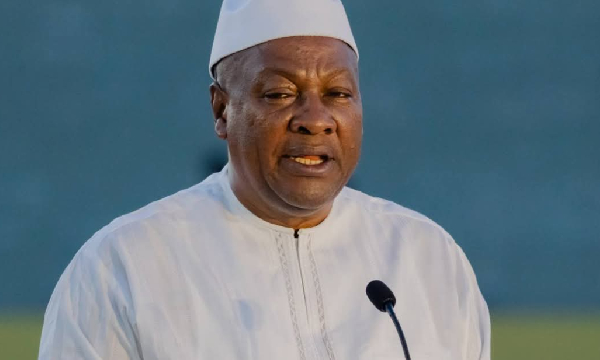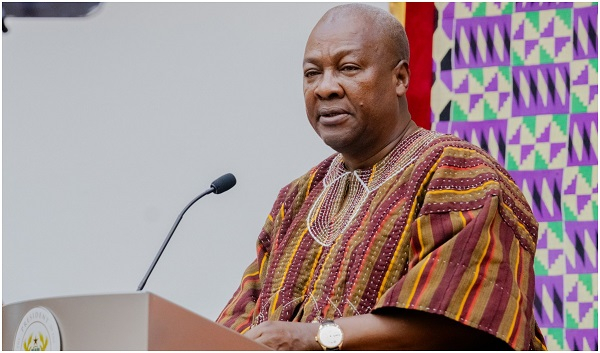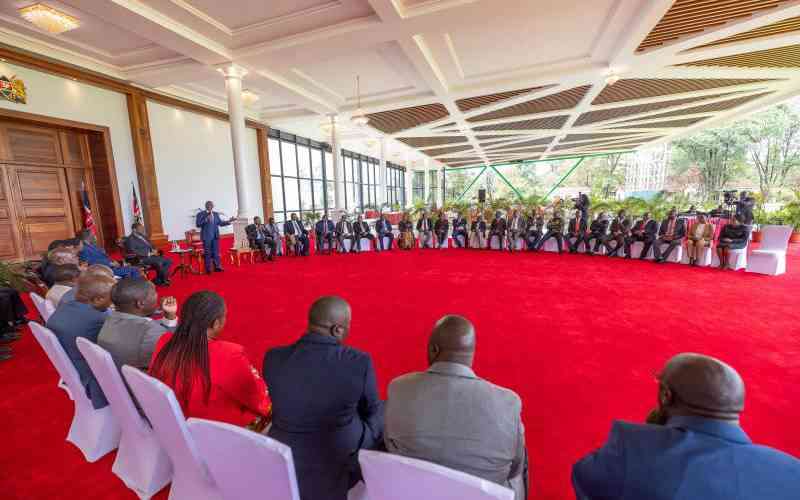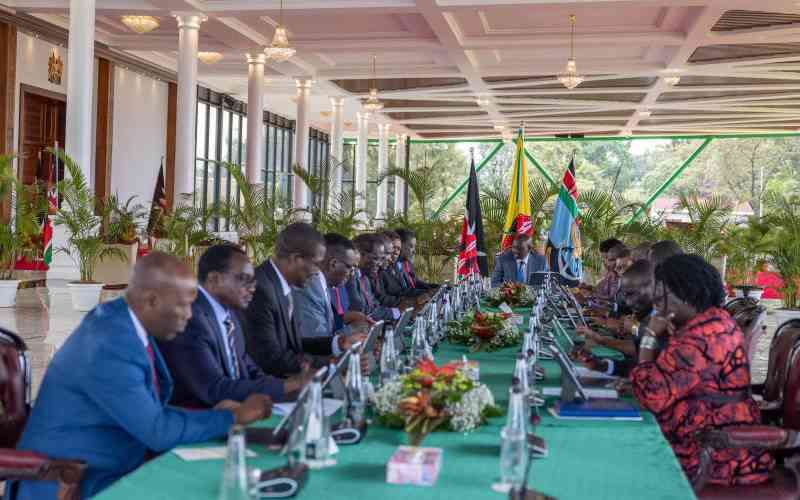Ruto reshuffle: Shifting blame or taking responsibility?

The many changes President William Ruto has effected in his two-year-old government and his report card on those he has already booted raises serious questions about what the president values most: competence or friendship.
When picking his appointees, the president has made a name for showering them with praises about their integrity and expertise, but it is a different story when they ultimately get the boot.
Before firing former Cabinet Secretary for Public Service and Human Capital Development Justin Muturi, President Ruto believed he was an astute public servant, even as he hailed his experience in national leadership. This was in May 2019 when he backed Muturi for Embu governorship after he abandoned former President Uhuru Kenyatta to support his Presidential bid.
As Muturi led the Democratic Party to join the Kenya Kwanza Alliance, Ruto showered him with praises saying they had worked together for many years and vouched for his statesmanship and that if he did not board his coalition, 2022 would be the only time they would be in different political outfits.
“Muturi has an outstanding track record, and I have a history with him as we have been in the same political camp over the years. His DP party strongly believes in reviving the economy, and that coincides with our manifesto,” Ruto, then Deputy President, said.
However, a day before axing him, Ruto described Muturi as fairly incompetent.
Mixed reactions as President Ruto reshuffles Cabinet
“I had a problem with the AG who was there before—he was fairly incompetent. But now, I have a very competent lady in the position, and I can assure you that the issues of Waqf will be sorted out within months,” the president stated.
When he was in good terms with his impeached Deputy, Rigathi Gachagua, he described him as a man who carries the aspirations of the people, an astute mobilizer, and a leader who understands the needs of the people. However, after he fell out with him and oversaw his impeachment, Ruto described his disgraced Deputy as a tribal bigot who was incompetent and clueless.
He used the same words against his Cabinet and Principal Secretaries in August 2023 when he chided them as clueless, claiming they had scanty information about the dockets they held.
Ruto who spoke during the signing of performance contracts at State House said some of the CSs and PSs were clueless about what was happening in their respective departments and ministries.
“I call many PSs and ask them what is going on here and they have no clue and this is your department, that is the job that you have; you are not a messenger, you are not a security person, you are not a photographer, you are not a watchman. You are the PS or the minister and you don’t have information. how do you run a ministry, a department, or a parastatal if you have no information? That is the highest level of incompetence.”
Stay informed. Subscribe to our newsletter
Wondering how they would advise him, Ruto stressed that the majority of the CSs and PSs had little information about their dockets and challenged them to embrace a culture of reading to familiarise themselves with what is going on.
On July 11 last year, while dissolving the Cabinet, the President claimed most of his Cabinet would have done better, saying that his decision to dissolve the Cabinet was informed after listening to the people of Kenya.
“Upon reflection, listening keenly to what the people of Kenya have said and after a holistic appraisal of the performance of my Cabinet and its achievements and challenges, I decided to dismiss with immediate effect all the Cabinet Secretaries and the Attorney-General from the Cabinet of the Republic of Kenya except the Prime Cabinet Secretary and Cabinet Secretary for Foreign and Diaspora Affairs,” the President said.
However, while reconstituting the new Cabinet, he retained most of the CSes whom he had fired.
Among the new nominees of his Cabinet, Ruto included Muturi’s name and forwarded it to the National Assembly, which later approved it.
Political experts have likened Ruto’s constant reorganisation of his government to a chef who constantly blames the ingredients for a bad meal.
Prof Gitile Naituli, a professor of management and leadership at Multimedia University of Kenya, recalled that from the moment he took office, the President promised a government that would deliver economic transformation, lower the cost of living, and create jobs.
“Instead, Ruto’s administration has been marked by frequent policy missteps, rising public discontent, and now, a revolving door of Cabinet appointments. Each reshuffle is packaged as a fresh start, a move to enhance efficiency and accountability. Yet, with every change, the same problems persist—high taxes, ballooning public debt, worsening corruption, and an economy that continues to burden ordinary Kenyans,” Prof Naituli noted.
He cast aspersions that the reshuffles were about performance, saying if they were, Kenyans would have seen results. According to Naituli, the President was trying to shift blame rather than take responsibility.
ALSO READ: Ruto in fiery meeting with Western leaders before Cabinet reshuffle
“A leader confident in his vision does not need to keep replacing his team; he leads with clarity, provides a clear policy direction, and ensures competent implementation. Ruto’s constant cabinet shake-ups reflect deeper issues in his leadership. The problem is not the people he appoints—it is the chaotic governance style that prioritizes personal loyalty over competence. It is the political patronage system that rewards cronies instead of professionals. It is the unwillingness to acknowledge that real leadership is about accountability, not reshuffling the deck chairs while the ship continues to sink,” Naituli opined.
According to Daina Gichengo, the Executive Director at The Institute for Social Accountability(TISA) said the committed technocrats who are public servants who are not rewarded due to their exemplary performance noting that those who do not deliver are the ones who are always promoted.
“There lacks proper evaluation performance measures that could guide the reshuffles and the re-organization of government. The President announced to the country about the performance scorecard, but it has never been made public. Tisa has petitioned several officials who have not been delivering, but instead of action taken against them, they have ended up being taken to powerful dockets,” she noted.
She also faulted Parliament for approving the appointment of officials with integrity questions, a move she said was a blow to the culture of meritocracy, competency and integrity among civil servants.
Phanice Omondi, a political analyst, noted, “Public shaming officials erodes public trust in them; it undermines the integrity of government institutions and shifts focus from solutions to blame. A good leader corrects mistakes internally, ensuring stability and professionalism. Constructive leadership demands diplomacy, not public condemnation to foster unity and effective service delivery”.
Makueni Senator Dan Maanzo said, “The buck stops with the President, failure by the government to deliver can’t be blamed on the government officials but the President. Kibaki revived the economy in his 100 days in office because it was not about his choice of Css but his policies and economic blueprint.


